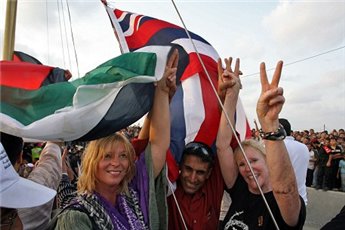
BY: YOUSEF MUNAYYER
Hundreds of activists are on their way to the blockaded Gaza strip via a “flotilla” of boats carrying humanitarian and reconstruction supplies, which are badly lacking in the impoverished Palestinian territory.
Israel has promised to intercept the good-willed boats and arrest and deport the activists. The Israeli Ministry of Foreign Affairs has exerted great effort in the past few days to convince onlookers to this confrontation on the high seas that the activists carrying humanitarian goods are terrorist sympathizers, and that everything is just fine and dandy in the Gaza Strip. The ministry has portrayed Israel (the country enforcing the blockade of Gaza’s ports) as a benevolent victim, who despite the threat from Gaza’s Hamas government is still caring for the civilian population.
There comes a point when an oppressive regime’s propaganda crosses a threshold from mere lies to utter lunacy so extreme, in fact, that objective onlookers find it almost comical. This point came yesterday when the Government Press Office disseminated a link to a Gaza restaurant which appears to be luxurious. So what Israel is essentially saying is: “There you have it. There is a website for a restaurant with cloth napkins in Gaza. How can there be any problems?”
The reality is, of course, that the situation in Gaza is very dire. A slew of reports from human rights organizations attest to the hardships faced by most Palestinians in Gaza. In the densely populated strip where 80 percent of the population are refugees, a similar percentage relies on international aid organizations for daily sustenance. That number was only ten percent a decade ago. That’s how bad things have become. Malnutrition in children has reached ten percent and critical medicines are not available, according to the World Health Organization.
But no one is starving to death in Gaza–at least not suddenly. A tunnel industry has evolved and become the main supplier for most goods. That’s all part of the plan. Israel seeks to squeeze the strip to the point of near catastrophe, bad enough to make people suffer, but just short of having to take responsibility for it. It’s a form of torture kind of like water-boarding under the Bush administration: the objective is to bring the subject to the edge and break his will, but not kill him (lest they be charged with murder). But just because Gaza’s civilian population has managed to keep its collective head above water doesn’t mean things should be this way.
Like life in most prisons, if you “know a guy,” anything is available for a price. Generators, for example, are in high demand because of the shortages of electricity. The shortages are due to the destruction of Gaza’s only power plant in 2006 by Israeli jets. Since then, Israel has never permitted the full reconstruction of the power plant, forcing perpetual dependence of Gaza on Israel and Egypt, who take an eye-dropper approach to supplying Gaza with electricity. But even though generators smuggled through Gaza’s tunnels provide some light, there is also a dark and often unheard downside that comes with them: explosions and fires. Several reports in the past few years of civilians being killed or maimed from overworked and exploding generators have become common. These are just some of the siege-related causalities we do not hear about.
The 10,000 tons of supplies aboard the Gaza aid ships are a drop in the bucket for what Gaza really needs. Israel’s spokesmen have pointed out that they have permitted the entry of supplies in the past and argued that the aid boats are unnecessary. The reality is that aid which Israel does permit into Gaza is purchased by Palestinians, vetted and often rejected or held up for months. Israel has calculated the precise minimum necessary caloric intake for Palestinians in Gaza, and has often rejected things like pasta, lentils and coffee. So it’s easy to understand why international humanitarian organizations and the activists aboard the aid boats are not about to trust the welfare of Gaza’s civilians to Israel’s benevolence.
The aid boats will have a far greater impact, however, than the 10,000 tons of aid they are bringing to Gaza. The aid boats compel us to have this discussion, a discussion that Israel desperately wants to avoid at a time when its international reputation has never been lower.
Hundreds of unarmed civilians carrying humanitarian aid are approaching a blockaded piece of land where 1.5 million civilians suffer from a life of uncertainty and despair, and Israel is going to stop them. While much of the focus on the Israeli-Palestinian issue has been on the settlements, the failed peace process and the long-awaited restart of talks about talks, Gaza has been forgotten. To their credit, the few hundred non-violent activists-turned-sailors have found a way to maximize their power as individuals to force one of the world’s most powerful regimes into a corner. Whether the boats make it to Gaza or not, this is a tremendous victory for civil society in international affairs.
Headlines and stories covering this confrontation at sea will shift the focus back to Gaza, even if only for a few hours. For Israel, Gaza is the tortured and famished step-child it locks in the basement when visitors arrive, and the activists on these boats seek to expose what Israel is doing in the strip: imposing a draconian siege to collectively punish civilians for political aims.
This article originally appeared on Foreignpolicy.com.
Yousef Munayyer is Executive Director of the Palestine Center.
http://www.thejerusalemfund.org/ht/display/ContentDetails/i/12964/pid/2254
